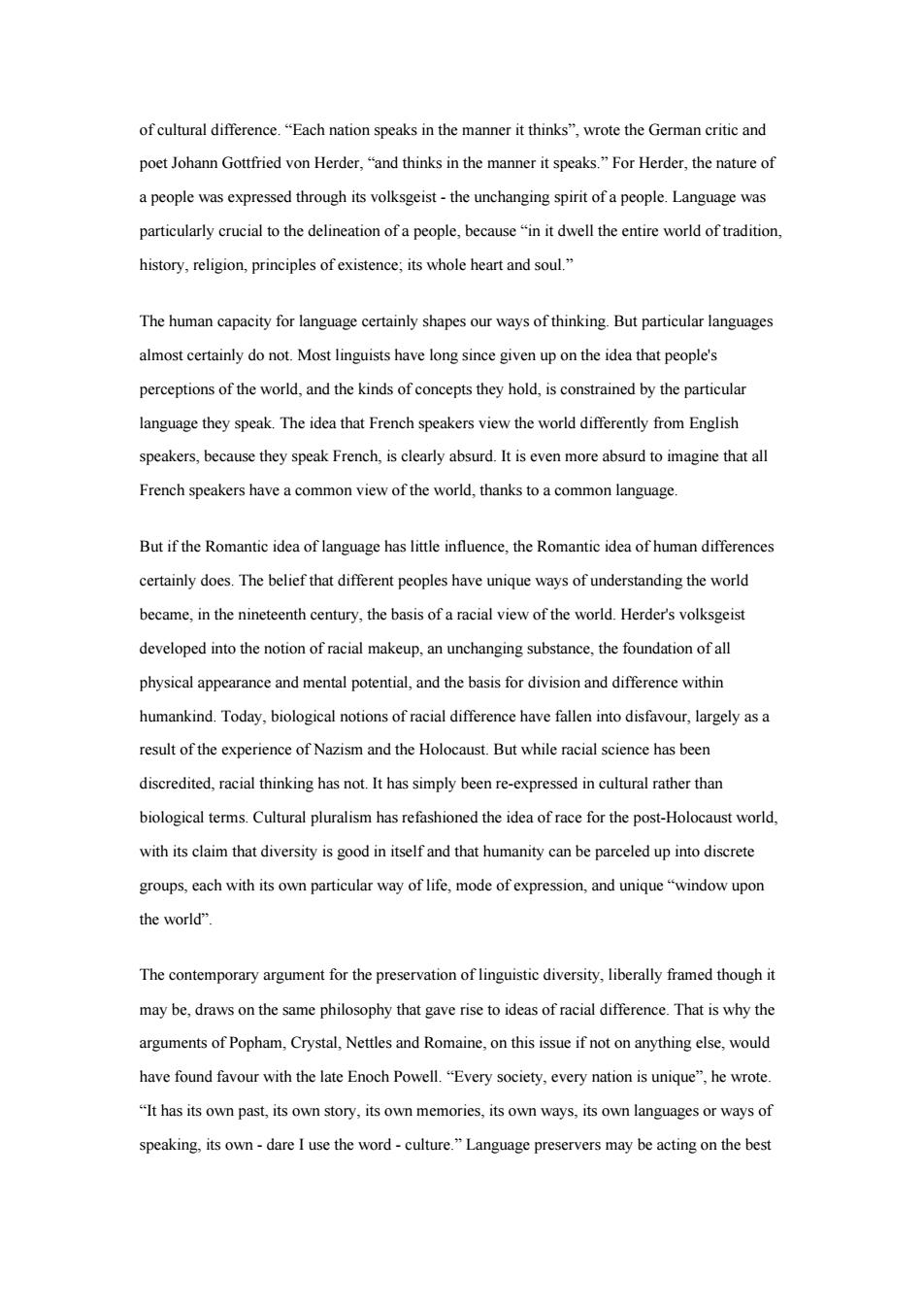正在加载图片...

of cultural difference."Each nation speaks in the manner it thinks",wrote the German critic and poet Johann Gottfried von Herder,"and thinks in the manner it speaks."For Herder,the nature of a people was expressed through its volksgeist-the unchanging spirit of a people.Language was particularly crucial to the delineation of a people,because"in it dwell the entire world of tradition, history,religion,principles of existence;its whole heart and soul." The human capacity for language certainly shapes our ways of thinking.But particular languages almost certainly do not.Most linguists have long since given up on the idea that people's perceptions of the world,and the kinds of concepts they hold,is constrained by the particular language they speak.The idea that French speakers view the world differently from English speakers,because they speak French,is clearly absurd.It is even more absurd to imagine that all French speakers have a common view of the world,thanks to a common language. But if the Romantic idea of language has little influence,the Romantic idea of human differences certainly does.The belief that different peoples have unique ways of understanding the world became,in the nineteenth century,the basis of a racial view of the world.Herder's volksgeist developed into the notion of racial makeup,an unchanging substance,the foundation of all physical appearance and mental potential,and the basis for division and difference within humankind.Today,biological notions of racial difference have fallen into disfavour,largely as a result of the experience of Nazism and the Holocaust.But while racial science has been discredited,racial thinking has not.It has simply been re-expressed in cultural rather than biological terms.Cultural pluralism has refashioned the idea of race for the post-Holocaust world, with its claim that diversity is good in itself and that humanity can be parceled up into discrete groups,each with its own particular way of life,mode of expression,and unique"window upon the world". The contemporary argument for the preservation of linguistic diversity,liberally framed though it may be,draws on the same philosophy that gave rise to ideas of racial difference.That is why the arguments of Popham,Crystal,Nettles and Romaine,on this issue if not on anything else,would have found favour with the late Enoch Powell."Every society,every nation is unique",he wrote. "It has its own past,its own story,its own memories,its own ways,its own languages or ways of speaking,its own-dare I use the word-culture."Language preservers may be acting on the bestof cultural difference. “Each nation speaks in the manner it thinks”, wrote the German critic and poet Johann Gottfried von Herder, “and thinks in the manner it speaks.” For Herder, the nature of a people was expressed through its volksgeist - the unchanging spirit of a people. Language was particularly crucial to the delineation of a people, because “in it dwell the entire world of tradition, history, religion, principles of existence; its whole heart and soul.” The human capacity for language certainly shapes our ways of thinking. But particular languages almost certainly do not. Most linguists have long since given up on the idea that people's perceptions of the world, and the kinds of concepts they hold, is constrained by the particular language they speak. The idea that French speakers view the world differently from English speakers, because they speak French, is clearly absurd. It is even more absurd to imagine that all French speakers have a common view of the world, thanks to a common language. But if the Romantic idea of language has little influence, the Romantic idea of human differences certainly does. The belief that different peoples have unique ways of understanding the world became, in the nineteenth century, the basis of a racial view of the world. Herder's volksgeist developed into the notion of racial makeup, an unchanging substance, the foundation of all physical appearance and mental potential, and the basis for division and difference within humankind. Today, biological notions of racial difference have fallen into disfavour, largely as a result of the experience of Nazism and the Holocaust. But while racial science has been discredited, racial thinking has not. It has simply been re-expressed in cultural rather than biological terms. Cultural pluralism has refashioned the idea of race for the post-Holocaust world, with its claim that diversity is good in itself and that humanity can be parceled up into discrete groups, each with its own particular way of life, mode of expression, and unique “window upon the world”. The contemporary argument for the preservation of linguistic diversity, liberally framed though it may be, draws on the same philosophy that gave rise to ideas of racial difference. That is why the arguments of Popham, Crystal, Nettles and Romaine, on this issue if not on anything else, would have found favour with the late Enoch Powell. “Every society, every nation is unique”, he wrote. “It has its own past, its own story, its own memories, its own ways, its own languages or ways of speaking, its own - dare I use the word - culture.” Language preservers may be acting on the best